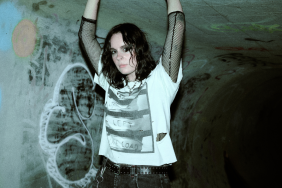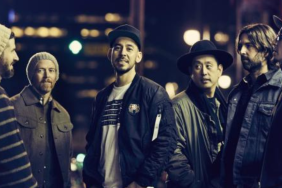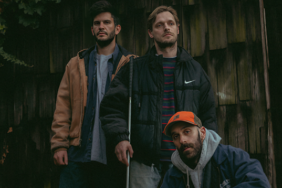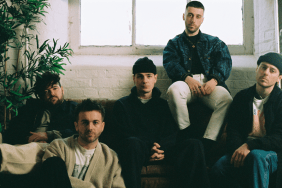Gang of Youth’s frontman Dave Le’aupepe has been through a lot for your average 24 year year old from Sydney. The last five years have been particularly tumultuous, though. Between supporting his young wife through cancer, the breakdown of his marriage, stints of drug and alcohol abuse and a life changing suicide attempt in 2014, he had much to reflect on in their 2015 debut The Positions. Team this narrative with an Australiana take on the likes of Springsteen and Sonic Youth and you can’t help but be drawn to the raw honesty of the quintet.
After spending the last year touring The Positions around the world, the boys are back in town and ready to release their new EP Let Me Be Clear. The tracks may have been written at the same time as some of the songs on The Positions but the EP stands alone as a testament to one period of the singer’s life in particular. Among this collection of six tracks, you can expect poetically heartbreaking lyrics, atmospheric orchestral arrangements and GOY’s signature indie rock sound.
Very aware that his reflections of their work sounds like he’s swallowed a profound thesaurus, Le’aupepe seems determined to create music only if it means something. This is especially true for Let Me Be Clear, an EP he’s dubbed the bookend to his early 20s and a means to close that chapter of his life.
We spoke to the GOY figurehead about the new EP and being a “deeply existential millennial trying to connect with other human beings”.
Music Feeds: Congratulations on finishing the new EP Let Me Be Clear. Five of the six songs on the album were originally written for The Positions, right?
Dave Le’aupepe: Oh, thank you, man! Yeah, I wrote them sort of before and during that process. So it’s not like they’re the dregs of the record. They’re actually songs that didn’t fit sonically or thematically but we still wanted to include them in some kind of body of work. So an EP was the way to go about it.
MF: The EP definitely has similar vibe to The Positions, though.
DL: Yeah, I was in that place at that time. You can really tell that I was functioning under certain delusions that I’m not functioning under now.
MF: A lot of bands write more songs than they release. Were you ever tempted to just leave those songs be?
DL: Oh, man. We have a lot of songs left that we haven’t put on anything. I wrote like 40 songs for The Positions. For the most part, I’m pretty selective of the material that people hear. Probably because I’m protective over the reputation of our work. But also, I hate everything I do. So once it’s out there, I fucking hate it but I can’t change it. It’s out there. (Laughs).
MF: Is that tough then – singing those songs over and over every night if you’re not always happy with them?
DL: That’s a good question. I sing them over and over again because I’m cathartic. I’m still probably really damaged. Like, just because something is really honest that doesn’t mean it’s good and just because it’s not doesn’t mean it’s not honest or real. It’s not a symbiotic relationship there. I’m not really the right person to say it’s good, but it’s honest and it’s real and it’s who I was at that stage. All of that trauma still informs my daily essence and I kind of like that. I kind of like that I’m able to just let go of all of that fucking garbage that’s inside. It’s really rewarding. It’s fun.
MF: Yeah, I’m sure it’s a more satisfying way to deal with your problems than most people can.
DL: Yeah, totally!
MF: In the past, you’ve mentioned that the previous album took so long to record because you’re a bit of a perfectionist and the songs took on many forms before you were all happy with them. Was it the same process this time around?
DL: (Laughs) Yeah, well I’m pretty set on getting stuff right. But this time around I didn’t have a drug problem, so that helped. The thing about this process is that I was able to just let go of a few things and collaborate properly in the studio. The writing process, for me, is one that the guys in the band really respect because it’s my contribution to that project. It’s my solipsistic, solitary endeavour. It’s an enterprise I kind of engaged in by myself. So that was still the same, but the way that we interacted and the way that we related to each other was different.
It was a lot better, it was a lot more honest and a lot more something that we did for fun rather than trying to fulfil a contract or an obligation to make this critically acclaimed work. It felt like, I use the word cathartic, but it’s not cathartic. It’s just like we’re expelling a lot of shit that’s inside of us. The EP itself functions as a bookend. It’s closing a chapter of my life of when I was a kid in love with this girl suffering persistently and without regress.
MF: Yeah, it seems like the EP taps into a lot of the themes and stories you were exploring on the first album. How come you think this particular collection of songs worked best together and not on The Positions?
DL: Well, they’re all songs that were written before the breakdown of my marriage. So the EP is sort of like a reference to this blind loyalty and nostalgia I had as a 20 or 19-year-old. The naivety about the world and love. The emotions that you feel as a 19-year-old are the same that you feel as a 90-year-old but you derive different things from it. You derive different purpose, different meaning. The emotions are real but the way that you deal with them is different.
And I’m finding now that as a 23 and 24-year-old, that the way I’m reinterpreting and reappropriating and all that shit is totally different. So, because The Positions took two to three years to write, I didn’t want to include things that were thematically digressing from where I’m heading towards in the album. The Positions is about being resigned to the fate. Not fatal necessarily, but just being resigned to the fact that not everything works out. Shit fucking sucks.
There is a sense of blind, naïve optimism about Let Me Be Clear that’s really nice. In retrospect, it’s really honest and kind of addresses a lot of the philosophical journey that happened after my marriage and after that shit broke down. (Sighs) Strangely, it’s like looking back. Like, you know when TV writers aren’t original enough to come up with a story line so they have a flashback episode? This is like a flashback episode. It’s kind of like kissing my early twenties goodbye. Kissing goodbye to 18, 19, 20, 21, 22, 23 and the years that I spent with that girl.
That’s the catharsis for me. That’s what I mean by that they wouldn’t fit well in with songs like Magnolia that is about having my heart broken and all that kind of stuff.
MF: So it’s almost like a prequel to The Positions?
DL: Yeah, absolutely. Absolutely. And there’s just some songs that didn’t fit sonically. Like, The Good Fight wouldn’t fit on The Positions. We already had slow, lumbering tracks that kind of heat up towards the end. Strange Diseases was just too short, it didn’t sound like it would fit within the narrative, it’s just too short a song. Native Tongues is kind of like… the way that we recorded it now is like 90s indie rock Pavements style and wouldn’t really fit with the Springstenian, Sonic Youth, The Killers-type sound that we did on the first record.
So there are those considerations as well. Sudden Light, I don’t know, I just don’t think it would’ve had a place within the narrative of The Positions to fit. It felt like, because these songs were written roughly at the same time, it felt really good to put them in their own little work and have them stand alone.
MF: The EP also features a really beautiful cover of Joni Mitchell’s song Both Sides Now. In a really intimate EP, what made you close with this song?
DL: What I can’t say about love Joni Mitchell can say. When I don’t have the words to find, when I don’t have the gravity, when I don’t have the vernacular to truly present to an audience, she can. So I’m able to frame everything I feel about love and life and relationships and misery and angst and beauty and importance in the world, that she frames really well in that song.
It’s a song that kind of… I mean, if there’s anything that this album is about it’s about being in love and I’ve seen what both sides of that can look like. And I think with love, sometimes there’s a very dualistic way that we perceive it. There’s a really, really… very genuinely pronounced duality within that song that I really liked and that I really identified really strongly with. And I’ve always really identified strongly with Joni Mitchell. I’ve covered heaps of Joni’s songs at Gang of Youths gigs. It sort of felt really cool to attempt to cover, I guess. I like doing covers. In some parts of the world we’re better known for our covers than we are for our own music, so I think that doing covers isn’t like a strange object to me.
MF: Yeah and I think that you guys really gave it your own twist, too. I think if people hadn’t heard that song before, they probably wouldn’t guess that it was a cover because it fits with the album so well.
DL: I mean, she’s a better melodist than I am. I’d like to think that people would get us confused but I highly doubt they would. But I do love that song. I love that she did two versions of that song. There was one on Clouds which is a record she released in the 60s or 70s and there’s another one that she released in 2002 or 2003 or something and it was in that Love Actually movie.
That version is pretty astonishing because you hear in the first version, she’s like this young idealistic hippie girl who sleeps around and hangs out with Leonard Cohen and she’s driving a convertible around Laurel Canyon in Los Angeles. Then you hear this 50-year-old woman singing it who truly has seen both sides of love. That’s a pretty profound thing. So I kind of feel like I’m in between that (laughs).
MF: Oh, really? I haven’t heard the newer version so I’ll have to give that a listen.
DL: Oh, you’ll love it. It’s honestly one of the most profound re-recordings of any artist ever. It’s pretty fucking beautiful. You’ll love it. And it’s all instrumental and all orchestral. And I arranged all of the strings on Let Me Be Clear. It’s kind of my secret passion. So listening to Both Sides Now done, it’s just really enlightening and it’s beautiful and very heartfelt. It’s very provocative too.
MF: In an interview with Music Feeds earlier this year, you mentioned that you hoped that Let Me Be Clear would be more of a human record than “The Positions”. Do you think you guys achieved that now that you have the finished product?
DL: I want to be the most human person I know. So I think that every record needs to be more human than the last. I mean, it’s only an EP it’s not like a full album so it’s been given less time to be that.
But do I think I’m more human? Yeah. I think when you listen to The Good Fight and there’s like that stream of consciousness that I do at the end of that, I think that’s on the way there. I think listening to Still Unbeaten Life, I like to think that there’s more humanity there then I had on The Positions. I think The Positions was very much a tool of grief, like a grieving device or a coping mechanism for a 20-year-old kid trying to figure out the universe. Trying to figure out mortality and love and sort of defiantly oppose all of these things. Like in Knuckles White Dry, “Call off your dogs, we’ll surrender no part of our love to the sun.”
There’s a defiance there and throughout The Positions and I just think it’s more resigned, there’s more resignation here [on Let Me Be Clear]. It’s like, being totally at ease with mortality, totally at ease with pain and humanness and reveling in that and considering it a gift from the universe or god or something. So The Positions was defiant, whereas this is resigned, accepting and still celebratory.
MF: Yeah, I don’t think you can hear the same frustrations on Let Me Be Clear as you can on The Positions and now that you explain it like that, it makes sense.
DL: Yeah, exactly. (Laughs) By the way, every answer I’m going to give you is going to be profoundly fucking pretentious and full of big words. I’m sorry.
MF: (Laughs) No, that’s completely fine. It’ll give me a bit of a challenge when I’m transcribing it.
DL: Fuck! (laughs) I’m sorry! I often forget that when I’m doing interviews that people have to write this shit afterwards and I’m like “fuck, I’m going to waste this person’s night if they’re going to try to figure out the meaningless fucking bullshit that comes spewing out of my mouth.”
MF: Well, it’s better than transcribing yes or no answers.
DL: Oh, absolutely. I’ll just answer you like any skinny white coward electronic artist would.
MF: (Laughs) Please don’t! There’s enough of that around.
DL: (Laughs) Are you sure you’ve had enough of EDM? Because you’ve got another 10 years of that shit coming your way.
MF: Back to your profound answers, though. Now that you’ve used this EP as a bit of closure to your early twenties, do you have an idea of what you’re going to be writing about for the next album?
DL: Yeah, I’m literally half way through writing the next album. Literally smack bang in the middle.
MF: That’s awesome. Any sneak peeks of what we can expect?
DL: Ummm, loneliness, empathy and trying to navigate the world as a lost, deeply existential millennial trying to connect with other human beings. A lot of it’s about my whole journey of reconciliation with what I am and finding meaning in the universe. And figuring out what being is. Like actual being. Just figuring that shit out. Like articles of faith, like my Christian upbringing and how I’ve integrated that into my fucked up adult life. Shit like that. Death, mortality and all that shit. Human things. People things. Grown up stuff.
–
‘Let Me Be Clear’ is out now and you can grab it here.












